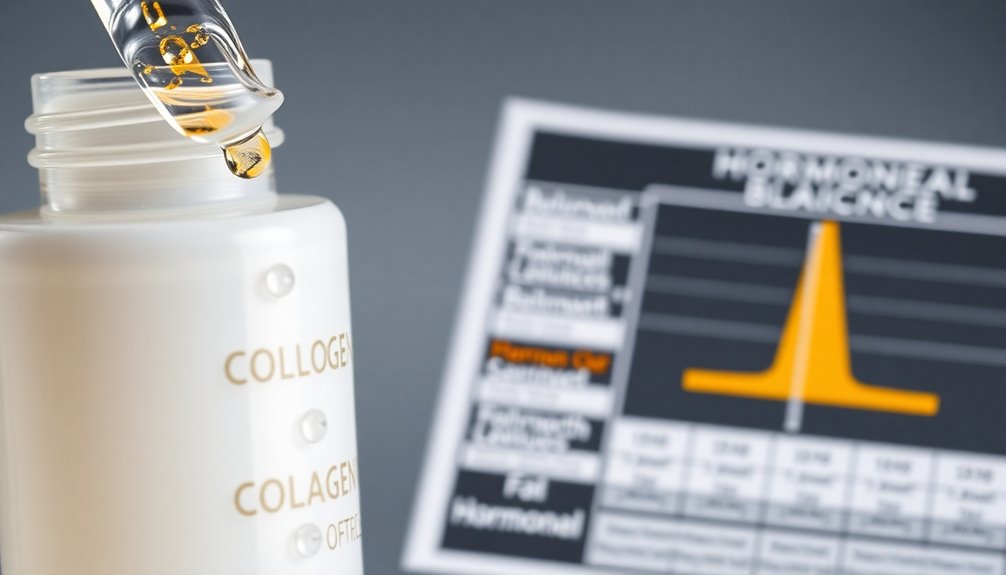Discover the essential link between collagen and hormonal balance in maintaining your skin's health and resilience. Estrogen plays a key role in stimulating collagen production, important for skin structure and smoothness. As you age, declining estrogen levels can lead to reduced collagen production, impacting skin elasticity and appearance. Understanding this connection can guide you towards skincare choices that support collagen maintenance and overall skin health. By exploring how collagen and hormonal balance intertwine, you can better address skin concerns associated with aging and hormonal changes, paving the way to healthier and more vibrant skin.
Key Takeaways
- Hormonal balance impacts collagen production.
- Estrogen deficiency leads to collagen loss.
- Balanced hormones support collagen synthesis.
- Hormones like estrogen influence skin elasticity.
- Maintaining hormonal balance is crucial for collagen health.
Understanding Collagen and Estrogen
When it comes to understanding collagen and estrogen, it's crucial to acknowledge the direct relationship between these two elements in maintaining skin health.
Collagen, a key protein, is responsible for supporting the structure and smoothness of your skin.
Estrogen, a hormone, plays a significant role in stimulating collagen production. However, as estrogen levels decline, particularly post-menopause, there can be a noticeable decrease in collagen production, leading to skin aging effects like reduced elasticity and firmness. Additionally, other factors such as UV exposure, smoking, and poor nutrition can also contribute to the decline in collagen production. Another significant factor that affects collagen levels is stress. Chronic stress can lead to an increase in cortisol levels, which in turn can inhibit collagen synthesis. Therefore, managing stress levels is crucial in maintaining healthy and youthful-looking skin. Research has shown how stress impacts collagen levels, highlighting the importance of incorporating stress-reducing practices into one’s daily routine.
Low collagen levels due to imbalanced estrogen can impact the skin's ability to maintain its youthful appearance. It's vital to understand how estrogen influences collagen production to guarantee your skin remains healthy and vibrant.
Effects of Aging on Collagen and Estrogen Levels
As you age, the dynamics of collagen and estrogen in your body undergo notable shifts, impacting the health and appearance of your skin. Collagen production peaks in your late twenties to early thirties, but as you enter early middle age, it begins to slow down. Simultaneously, estrogen levels fluctuate based on your menstrual cycle but decline after menopause, leading to post-menopausal women experiencing collagen deficiency.
This hormonal imbalance intensifies skin aging, resulting in thinner and weaker collagen fibers. The decrease in estrogen compromises collagen quality, making your skin less elastic, thinner, and drier, increasing its susceptibility to wrinkles. Estrogen deficiency post-menopause notably reduces collagen levels, affecting skin health and elasticity.
Understanding these changes in collagen production and estrogen levels is pivotal in comprehending how the aging process impacts your skin and the importance of maintaining hormonal balance for healthy connective tissues and skin health.
The Link Between Collagen, Estrogen, and Skin Health
Stimulating collagen production and maintaining optimal estrogen levels play a key role in preserving the health and vitality of your skin. Estrogen stimulates collagen production by binding to fibroblast receptors in the skin. When estrogen levels are low, wound healing can be compromised, and skin elasticity may decrease due to reduced collagen production.
Collagen, which makes up 70-80% of skin weight, is essential for skin health and structure. To support collagen production and promote healthier skin, hormone therapy or collagen supplements can help balance estrogen levels. Ensuring adequate levels of collagen and estrogen is necessary for enhancing skin health, elasticity, and overall anti-aging benefits.
Skin Care Tips for Healthy Aging
Consistently practicing good skincare habits is essential for maintaining healthy and youthful-looking skin as you age. To care for aging skin, start by using sunscreen with SPF 30+ daily to shield against UV damage and premature aging.
Moisturizing your skin regularly helps retain moisture, preventing dryness and supporting skin health. A diet rich in essential vitamins, omega-3 fatty acids, fruits, and vegetables contributes to healthy skin from within.
When selecting skincare products, opt for gentle ingredients and avoid fragrances and alcohol that can strip moisture from your skin. Establishing a consistent skincare routine, along with proper nutrition and sun protection, are key factors in promoting healthy aging skin.
Additional Ways to Care for Aging Skin
To continue nurturing your aging skin effectively, focus on incorporating additional strategies into your skincare routine. Along with using mild cleansers and hydrating your skin, choosing gentle skincare products can further nourish and protect your skin against the effects of aging. Proper nutrition plays a pivotal role in supporting skin health, so emphasize a diet rich in essential vitamins, omega-3 fatty acids, fruits, and vegetables for healthy aging skin.
Incorporating sunscreen with at least SPF 30 into your daily routine is vital to protect your skin from harmful UV rays and prevent premature aging effects. Regular moisturizing helps retain skin moisture, preventing dryness and maintaining overall skin health as you age. Be mindful of skincare product ingredients, avoiding fragrances and alcohol that can strip moisture from your skin and contribute to aging effects.
How Is Estrogen Connected to Collagen?
Boosting collagen production in your skin is crucial for maintaining its strength and elasticity. Estrogen plays a pivotal role in skin health by supporting collagen production. Estrogen binds to fibroblast receptors in the skin, influencing the activation of these cells and aiding in collagen synthesis.
Collagen, along with elastin, contributes to skin strength and flexibility, allowing it to retain its original shape. Lower collagen levels can result from declining estrogen levels, impacting skin firmness and elasticity. While collagen production doesn't directly mirror estrogen levels, there's a connection between the two.
To support your skin's health and combat the effects of declining estrogen levels, consider collagen supplementation to help maintain skin strength and elasticity. By understanding the relationship between estrogen levels and collagen, you can take proactive steps to promote healthy skin and overall well-being.
How Do Collagen and Estrogen Levels Change Over Time?
As you age, both collagen and estrogen levels undergo significant changes that can impact your skin health. Collagen and estrogen levels peak in your late 20s/early 30s before gradually declining over time.
During perimenopause, estrogen levels start decreasing, and this decline accelerates at menopause. This drop in estrogen levels affects collagen production, leading to a decrease in collagen levels. Collagen loss occurs at a rate of 1% annually in your late 20s/early 30s and speeds up post-menopause, with postmenopausal women experiencing an approximate 2% yearly skin collagen loss.
Menopause marks a significant decrease in both estrogen and collagen levels, impacting skin health and elasticity. Understanding how these hormonal changes affect collagen production is essential for maintaining healthy and youthful-looking skin as you age. Balancing hormonal changes and supporting collagen production can help counteract the effects of aging on your skin.
Skincare Concerns Associated With Low Collagen and Estrogen
Experiencing low collagen and estrogen levels can bring about various skincare concerns that affect your skin's health and appearance. Collagen loss leads to dryness, thinning, decreased elasticity, and the formation of wrinkles, while menopausal changes often link to collagen depletion, impacting skin texture and appearance.
Post-menopause, decreased collagen levels significantly contribute to intrinsic skin aging and related issues like dry, dull, fragile skin with visible wrinkles, indicating possible estrogen deficiency. Understanding the causes of estrogen deficiency and collagen loss is pivotal in selecting effective skincare products to address these concerns.
Frequently Asked Questions
Does Collagen Help Hormonal Imbalance?
Yes, collagen indirectly supports hormonal balance by promoting skin health influenced by estrogen levels. Imbalanced hormones might affect collagen production, impacting skin elasticity. Maintaining collagen through supplements or skincare can help balance hormones by supporting skin health.
What Is the Downside of Taking Collagen?
Taking collagen excessively can lead to bloating and digestive discomfort. It might disrupt amino acid balance and strain your kidneys. More isn't always better for skin or collagen production. Consult a healthcare provider before starting to prevent hormonal imbalances.
Does Collagen Affect Your Menstrual Cycle?
Yes, collagen can influence your menstrual cycle by impacting hormonal balance. Estrogen, important for collagen synthesis, plays a role in regulating your cycle. Supporting collagen levels through diet or supplements may help maintain hormonal balance and promote menstrual regularity.
Is Collagen Good for Females?
Yes, collagen is beneficial for females. It can support skin health, elasticity, and overall hormonal balance. Incorporating collagen into your routine may help maintain skin firmness and hydration, contributing to a healthy glow and combating signs of aging.
Conclusion
To wrap up, maintaining healthy levels of collagen and estrogen is crucial for skin health and overall well-being as you age. By understanding the connection between these two elements, you can make informed choices about skincare and lifestyle habits to support your body's natural balance. Remember to prioritize self-care, eat a balanced diet, and consult with healthcare professionals for personalized advice on maintaining best collagen and estrogen levels for healthy aging.


